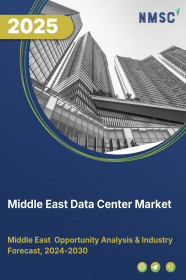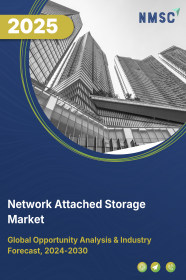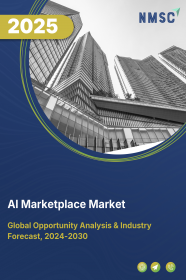
Middle East Data Center Market by Component (Hardware, Software, Service), by Type (Colocation, Hyperscale, Edge, Other Types), by Deployment Model (On-Premise, Cloud, Hybrid), by Tier Standard (Tier 1, Tier 2, Tier 3, Tier 4), by Energy Requirement & Power Density (Low Power, Medium Power, High Power), by Cooling Technique (Air Cooling, Liquid Cooling, Other), by Enterprise Size (Large Enterprises, Other), by End User (BFSI, Other End User)- Opportunity Analysis and Industry Forecast, 2024–2030
Industry: ICT & Media | Publish Date: 24-Apr-2025 | No of Pages: 190 | No. of Tables: 144 | No. of Figures: 89 | Format: PDF | Report Code : IC2436
US Tariff Impact on Middle East Data Center Market
Trump Tariffs Are Reshaping Global Business
Middle East Data Center Market Overview
The Middle East Data Center Market size was valued at USD 2.75 billion in 2023, and is predicted to reach USD 6.29 billion by 2030, at a CAGR of 12.6% from 2024 to 2030. The data center market, also known as the network infrastructure market, covers the entire lifecycle of specialized infrastructure for hosting computing systems, from initial planning and construction to ongoing operation and maintenance. This market includes a variety of components such as servers, storage systems, and networking equipment, that together provide services like cloud computing and connectivity solutions.
Currently, the industry is experiencing widespread adoption of cloud services and the rise of edge computing aimed at reducing latency. Key trends shaping the market include a strong emphasis on sustainability, increased cybersecurity concerns, the integration of hybrid and multi-cloud approaches, and the growing influence of 5G networks. These trends highlight the industry's proactive efforts to meet the rising demand for scalable, efficient, and secure data processing and storage solutions amid the ongoing digital transformation. According to projections by the United States International Trade Commission, the data processing and storage market is expected to grow from USD 56 billion in 2020 to USD 90 billion by 2025.
Investment in Digital Infrastructure Boosts the Growth of the Middle East Data Center Market
The Middle East region, encompassing countries such as UAE, Saudi Arabia, and Qatar, is witnessing significant developments in data center infrastructure. The UAE's Ministry of Investment and Egypt's Ministry of Communications recently signed a Memorandum of Understanding (MoU) to invest in Egypt's digital infrastructure, with plans to potentially develop 1GW of network infrastructure center capacity.
This collaboration, aligned with Egypt's "Digital Egypt" Vision 2030 plan, aims to establish 100MW initially, with discussions on incentives underway. It signifies the growing infrastructure center market in Egypt, projected to reach USD 1.1 billion by 2030, and underscores the strategic importance of partnerships in advancing digital infrastructure and technological capabilities within the region.
Implementation of Government Initiatives Towards Expansion of Data Centers Propels the Market Growth
Saudi Arabia's Ministry of Communications unveiled an ambitious USD 18 billion plan to establish a network of major data centers, with the goal of positioning the country as the primary hub in the region. Aligned with Saudi Vision 2030, this initiative seeks to attract global investors, with discussions underway with industry heavyweights such as Amazon and Google.
The plan aims to foster digital investments and the localization of services within the Kingdom, driving economic diversification and technological advancement. This initiative highlights Saudi Arabia's commitment to becoming a prominent player in the digital landscape and underscores the increasing significance of infrastructure centers in enabling digital transformation and innovation across the Middle East region.
High Initial Investment Hinders the Middle East Data Center Market Growth
The data center market faces significant hurdles, primarily due to the substantial initial investment required and stringent environmental regulations. Establishing and maintaining network infrastructure demands considerable upfront financial commitments, creating barriers for smaller enterprises and start-ups attempting to enter the market. Additionally, ongoing compliance with environmental standards necessitates continuous investment in energy-efficient technologies hinders the overall Middle East data center market growth.
Integration of Edge Computing Presents Lucrative Opportunity for the Middle East Data Center Market Expansion
The integration of edge computing into operations presents promising prospects for the Middle East data center market expansion. By minimizing latency and enabling real-time processing, edge computing supports applications such as the Internet of Things (IoT) and Augmented Reality (AR), reducing the load on centralized cloud data center market while providing scalability and flexibility.
This decentralized approach not only enhances security by processing sensitive data locally but also aligns with evolving digital landscapes, creating diverse opportunities for network infrastructure providers. Recent investments in start-ups such as Armada indicate the growing interest in edge computing solutions, signaling a concerted effort to address connectivity challenges and bridge the digital divide.
Competitive Landscape
The key market players operating in the Middle East data center industry include Amazon Web Services (AWS), IBM Corporation, Microsoft Corporation, Cisco System Inc., Oracle Corporation, SAP SE, Hewlett Packard Enterprise Company, Equinix Inc., Digital Reality Trust Inc., Cloudscene, Zenlayer, Inc., G42, Vantage Data Centers,Iron Mountain, Inc., NVIDIA Corporation and others.
Middle East Data Center Market Key Segments
By Component
-
Hardware
-
UPS
-
Generators
-
Transfer Switches
-
Cooling Systems
-
Computer Room Air Conditioning (CRAC)
-
Racks
-
Others
-
-
Software
-
Services
By Type
-
Colocation
-
Hyperscale
-
Edge
-
Others
By Deployment Model
-
On-Premises
-
Cloud
-
Hybrid
By Tier Standard
-
Tier 1
-
Tier 2
-
Tier 3
-
Tier 4
By Energy Requirement and Power Density
-
Low Power (Less than 20MW)
-
Medium Power (20-100MW)
-
High Power (100MW and More)
By Cooling Techniques
-
Air Cooling
-
Liquid Cooling
-
Dry Cooling
-
Immersion Cooling
-
Others
By Enterprise Size
-
Large Enterprise
-
Small and Medium Size Enterprise
By End User
-
BFSI
-
IT and Telecom
-
Government
-
Energy and Utilities
-
Other End Users
By Countries
-
Saudi Arabia
-
United Arab Emirates (UAE)
-
Israel
-
Qatar
-
Kuwait
-
Oman
-
Other Countries
Key Players
-
Amazon Web Services (AWS)
-
IBM Corporation
-
Microsoft Corporation
-
Cisco System Inc.
-
Oracle Corporation
-
SAP SE
-
Hewlett Packard Enterprise Company
-
Equinix Inc.
-
Digital Reality Trust Inc.
-
Cloudscene
-
Zenlayer, Inc.
-
G42
-
Vantage Data Centers
-
Iron Mountain, Inc.
-
NVIDIA Corporation
- REPORT SCOPE AND SEGMENTATION:
|
|
|
|
|
|
|
|
|
|
|
|
|
|
|
|
|
|
|
|
|
|
|
|
|
|

















 Speak to Our Analyst
Speak to Our Analyst





















